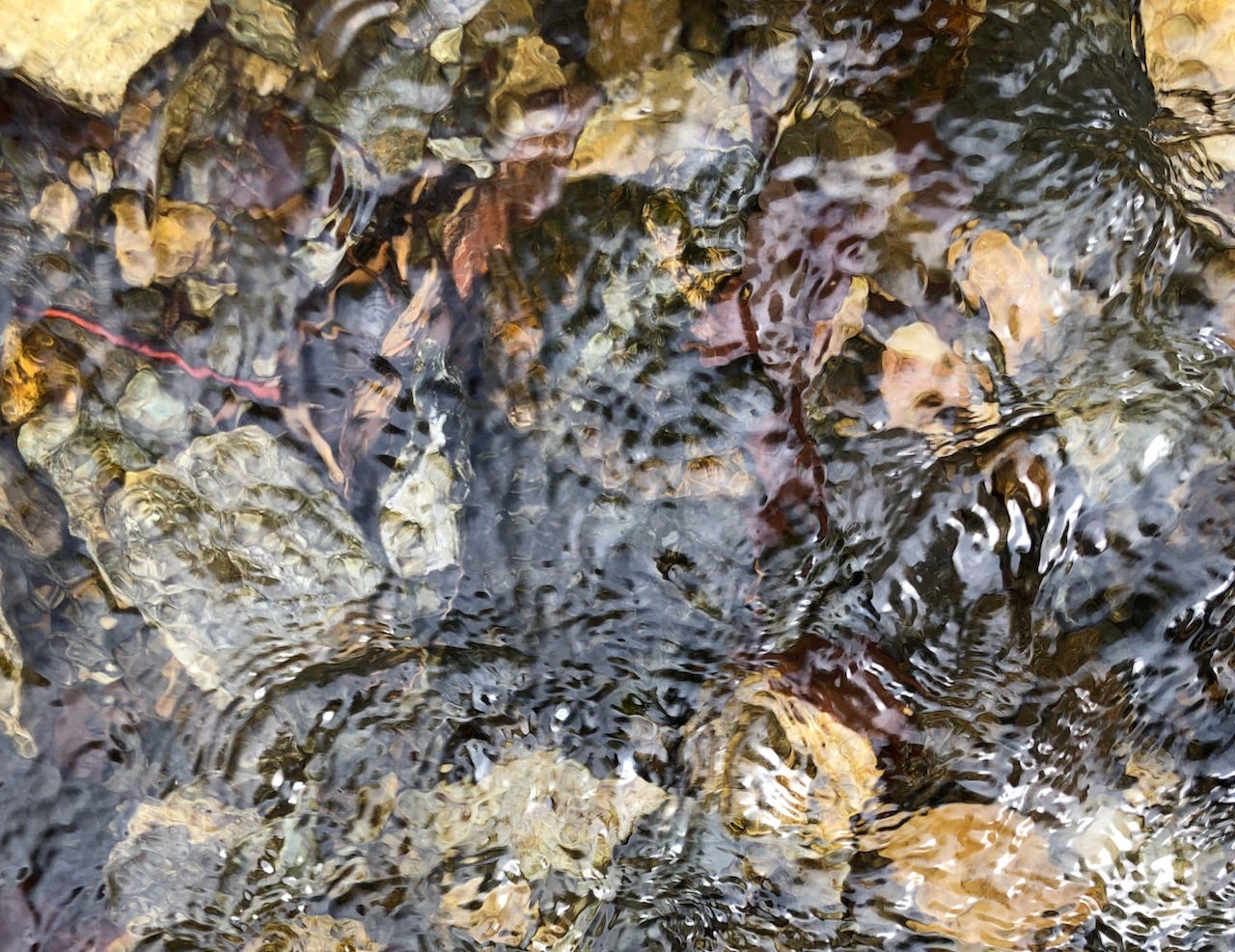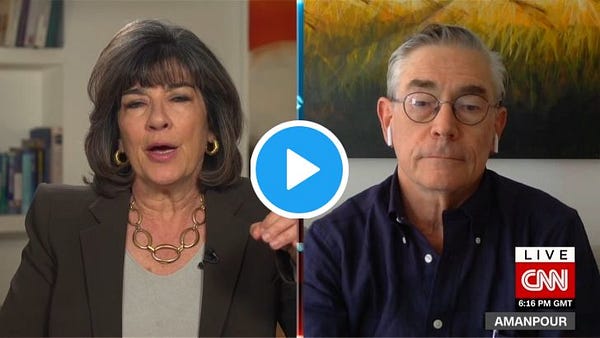Media layoffs, both sides-ism, and credible news
Expertise in journalism has never been more important, and we're losing it - fast.

This edition was produced with Zach Peterson (@zachprague), who took this picture of a bubbling stream last week in the Jeseniky Mountains.
Scroll down for Read Something, Watch Something, Listen to Something, and my Sunday NYT Readalong where we talked politics w/ guests Rick Wilson (@TheRickWilson) and Steve Schale (@steveschale) with 50K+ viewers.
The best way to know when I’m on the air, and see all my archived Covid19 shows, is to subscribe to my YouTube channel. We’ve been going for 66 straight days and will keep going till the lockdown ends.
My team is working with companies and nonprofits around the world to create virtual events. We can help you, too. Don’t cancel or postpone that conference - call us!
***
This was an absolutely brutal week - on top of a brutal few months - for journalism.
Quartz closed four offices and announced layoffs, The Economist Group is letting people go, BuzzFeed News UK and Australia are now gone, Vice Media is cutting staff… and on and on. This was just in the last week.
Local news media is struggling financially, major national outlets are struggling financially, advertising dollars will be increasingly hard to come by over the next 3-6 months - at least - and our public discourse will likely continue to pay the price.
It’s awful enough having thousands of people out of jobs in an industry so important, but we’re reaching a real breaking point for news and information in America. Local news is consolidating, national news is as much opinion/entertainment as it is useful news, and further cuts means fewer voices being heard.
For the best reporting about the US media and what's happening to it and around it, check out the Reliable Sources newsletter by Brian Stelter (@brianstelter) and Oliver Darcy (@oliverdarcy).
All of this means the people still out there reporting the news have even more pressure on them to get it right. Which brings me, as so much media criticism often does, back to Jay Rosen’s (@jayrosen_nyu) “View from Nowhere” argument and how it relates to media layoffs and reporting truthfully.


Donald McNeil, Jr. knows as much or more about pandemics than any working journalist. On April 18, when there were 34,000 confirmed Covid19 deaths in the US, McNeil, Jr. wrote a long story that served as a sort of look ahead for re-openings, testing, new surges of the virus, and more. A month later, it’s an amazing, depressing read. It notably predates the armed re-open “protests” in Michigan and elsewhere, but otherwise it lays it all out there perfectly.
McNeil, Jr. does this so well because he’s an expert. He’s been covering pandemics and the responses to them for years for The New York Times. He wrote a book about the Zika outbreak. He’s won awards for his reporting on AIDS.
In short, he’s qualified. But, as a reporter on the news side of things, his comments about the leadership of the CDC and other government agencies, came as a bit of surprise.


He’s stating an opinion, but his case rests on very public information. It may be a “personal opinion” in the strictest sense of the word, but the evidence is overwhelming.
This is the danger of both-sidesism and the view from nowhere. Muddling the space where real, knowable facts exist has served fringe conservatives quite well over the past 30 years, and working the refs - in this case the mainstream news media - has worked. Some ardent supporters of the president may indeed believe that Robert Redfield has led the CDC effectively, but they are - to put it plainly - wrong, and there is ample evidence as to why. Let’s face it, the president is the real problem here, and his lack of leadership may end up costing a hundred thousand (or more) American lives.
This is not in dispute, and may actually be a low-ball estimate. Whether or not the president’s supporters want to acknowledge it simply isn’t something everyone else should concern themselves with. The facts are the facts, and reporters at major outlets should be able to report on the facts without giving the usual, “while some conservatives disagree” caveat.
Yet, because of our cultural obsession with straight-down-the-middle news, respectable, intelligent journalists and their editors feel the need to give air to views, opinions, and worse that do more to damage trust in media than increase it.
Erik Wemple, media reporter for The Washington Post, gets it pretty much right, I think:
Such is the coronavirus backdrop — unfathomable pronouncements of incompetence, indifference and cluelessness from the president in public appearance after public appearance. What’s an experienced health reporter to say?
Experienced health reporters should speak up, defend the facts, and keep doing great work. We need them and their expertise now more than ever.
- Sree
Global Entrepreneurship Experience
With IRL summer teen camps canceled, take advantage of this new virtual entrepreneurship one week camp at which I am honored to be a lecturer. An entrepreneurial mindset and business/life skills are going to be even more important post-pandemic. Get a 20% discount if you register by Wednesday’s early-bird deadline. Use code: SREE at Global Entrepreneurship Experience (Rutgers).
Read Something
🤴🏼 Facebook is not a democracy, it’s Mark Zuckerberg’s and Mark Zuckerberg’s alone. Mike Isaac (@MikeIsaac), Sheera Frenkel (@sheeraf), and Cecilia Kang (@ceciliakang) go long on misinformation on the platform, the company’s increasingly-pliant board of directors, and so much more about the world’s most powerful social media company. Or should I say world’s most powerful media company? Or world’s most powerful company? Read it @ The New York Times.
🎓 University life will not be the same in America, not in the near future anyway. There are alot of competing views on what post-Covid higher ed looks like, and Scott Galloway (@profgalloway) has a particularly good eye for things like this. We’re going to see a lot of gap years, a boom in MOOCs from major universities (he calls them “cyborg universities”), and tuition levels maybe, just maybe, come down. Read it @ New York Magazine.
A Note from Muck Rack

My friends Greg Galant (@Gregory) and Lee Semel (@semel) do cool things - founding Muck Rack and the Shorty Awards, eg. And we’ve done cool things together for more than a decade, including judging the Shorty Awards w/ MC Hammer and Alyssa Milano; revealing the most Twittery journalists as of 2012; interviewing DJ Khaled and then walking through Times Square w/ FB Live; interviewing Jerry Stiller (aka Frank Costanza) and his wife Anne Meara in 2011 (so sad to see both have now passed).
I am pleased to announce that I have joined Muck Rack as an adviser to help their mission of building better tools for all comms professionals. And one of the first things we are doing is meant to help thousands of folks around the world raise their social media skills: launching a FREE certification course in social media. My colleague Linda Bernstein (@wordwhacker) and I are prepping it now and launching in early June. But you can sign up now at mrack.co/social. Please share with your friends and family - all ages, professions, experience, etc, welcome. #MRAsocial
Watch Something
There is nothing funny about this presidency, but Sarah Cooper is just so…necessary. These are great, but this one in particular just captures the tone perfectly. The marker sniff!
Listen to Something
It seems like Elon Musk comes and goes from the public discourse in waves. He does something weird (or abusive) on Twitter, doubles down, causes a stink, then goes relatively silent, and emerges with something like SpaceX. This doesn’t feel like one of those times. Mehdi Hasan (@mehdirhasan) discusses Musk’s descent into Covid-19 trutherism, and interviews California Assemblywoman Lorena Gonzalez (@LorenaSGonzalez) on Musk’s plans to open Tesla manufacturing in the state. Listen here or on every major podcast platform.
Odds & Ends
🗞 My Sunday #NYTReadalong, executive produced by Neil Parekh (@neilparekh): Every Sunday I read the print edition of the NYT live. This week, we were joined by two special guests: Rick Wilson, a #1 NYT Best Selling Author, whose book “Running Against the Devil: A Plot to Save America from Trump--and Democrats from Themselves” came out in January; and Steve Schale, a Florida-based political strategist. At 10am, we were joined by Dr. Kanika Monga, who answered questions about Covid19.
More than 60K folks have watched this episode. You should, too:
Facebook | LinkedIn | YouTube | Twitter
The Sunday #NYTReadalong is sponsored by Magic Bus USA, Strategy Focused Group and Muck Rack. Interested in sponsorship opportunities? Email sree@sreenet and neil@neilparekh.org.
🎧 NEW! Every Saturday, I host a call-in show on WBAI 99.5FM (@wbai) - "Coping with Covid19" - focused on being helpful, hopeful, and focusing on the pandemic's effects on society’s most vulnerable - workers, the poor, the marginalized - and talk to ordinary citizens & experts on how we can emerge stronger.
Listen live Saturdays from 12-2pm EST, or later. And, of course, call in or tweet questions for us using the #wbaisree hashtag! Listen to an early episode here!
📺 A reminder to watch my Daily Global Covid19 Show. You’ll laugh, you’ll cry, you’ll learn something every time. We’ve had 60 shows and 120+ guests. See the archive here and please subscribe to my YouTube channel. And/or sign up for my WhatsApp alerts list (it’s not your typical WhatsApp group, just a text when I’m live!). We are now in partnership with Scroll.in.
Recent highlights:
👀 Did we miss anything? Make a mistake? Do you have an idea for anything we’re up to? Let us know! Let’s collaborate.






